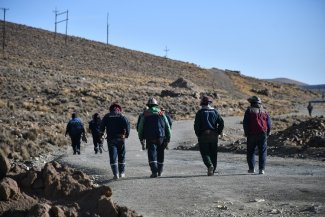Job insecurity, an unemployment rate above 25 per cent, slashed salaries and pensions, massive household debt: these are just some of the reasons why Greece’s Syriza-led government is trying to roll back austerity measures.
But there could also be another motive, which is a direct consequence of all the aforementioned factors: population decline.
According to the latest figures from the Greek Statistical Authority (ELSTAT) on natural population change, there were 111.794 deaths in 2013 compared to only 94.134 births, resulting in an overall population decrease of 17.660.
This trend has been picking up steam in the last few years. In 2012, the decline amounted to 16,297 people. Almost four times that of 2011 when this number was of only 4,671.
Margarita Tzaki, director of the neonatal care unit at the Elena Venizelou maternity hospital in Athens tells Equal Times: “There has been a gradual reduction of births in the maternity hospital since 2009, when we had 7,009 births. In 2013 we had 4,478 births. That is a 37 per cent reduction.”
However, there are still couples who decide to take the big step of starting a family.
Natasa Georgantza and Nasos Efstratiadis welcomed their daughter Aphrodite to the world last October.
“It is something we both wished for at this given time of our life. Luckily enough we are one of those ‘lucky households’ where both parents are employed,” says 34-year old Natasa.
Together with her husband, they are both work in the private sector and their combined monthly salary reaches €1,600 (US$1740). But things are getting harder by the month.
Under Greek labour legislation, during the first 17 weeks of the maternity leave, Natasa will be entitled to her regular salary.
For the subsequent six months, however, she will only be receiving the special allowance for maternity protection provided by the Manpower Employment Organisation (OAED), which was cut from €613 (US$665) in 2012 to €487 (US$529).
“What a baby really needs is love, time and attention, and these are things we can generously offer,” explains Nasos.
But for many couples, a high salary and job security are still the most basic requirements needed to start a family.
Thirty-five-year-old therapist Artemis Spyropoulou and her husband Alexis Kouris had their first child, Iasonas, four years ago but say they can’t even think about having another one.
“Even if we wanted to have a second child, our financial circumstances wouldn’t allow it,” says Artemis.
Although their income is about €1,800 they have to count on Artemis’ parents to pay off their mortgage.
“We have great difficulties getting by every month. We count every single euro and this is something quite stressful,” adds Alexis.
Abandoned babies
More tragically, the economic crisis has increased the number of newborns abandoned in the rooms of maternity houses.
“Before 2009 we had around five babies abandoned per year. Since 2009 the number has increased to two or three every month,” says Tzaki.
“Mothers leave their children due to economic, psychological and social problems. There are also women who abandon their babies because they are born with health problems or because they are drug addicts.”
According to figures provided to Equal Times by the juvenile prosecutor of Athens, there were 45 babies abandoned in 2014 in the city’s two biggest maternity centres (Elena Venizelou and the maternity ward at the Alexandra general hospital) alone.
More than half of them (24 babies) did not have the opportunity to be directly transferred to an institution and had to remain in the hospital for several months.
“When a baby is abandoned we have to inform the juvenile prosecutor who orders its transfer to an institution. But, since many babies are also left in other maternity wards and hospitals, the transfer is delayed. Unfortunately, this results in the upbringing of the child in an unsuitable environment until the age of ten to 12 months,” she concludes.
The Mitera Infant Centre, a government-run children’s home, welcomed 56 toddlers in 2014, seven more than in 2013.
But this does not automatically result in the immediate transfer of babies to adoptive families.
The lack of personnel to process the demands and the public cuts in the state’s budget has reduced the number of adoptions.
At Mitera there were only 19 adoptions in 2014, compared to 33 in 2013.
According to the juvenile prosecutor, some children even end up staying in an institution for five or six years, which is a crucial formative period for human beings.









